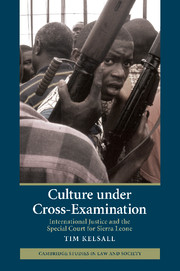Book contents
- Frontmatter
- Contents
- List of illustrations
- Preface
- 1 White man's justice? Sierra Leone and the expanding project of international law
- 2 The story of the CDF trial
- 3 An unconventional army: chains of command in a patrimonial society
- 4 Facts, metaphysics and mysticism: magical powers and the law
- 5 We cannot accept any cultural consideration: the child soldiers charge
- 6 ‘He's not very forthright’: finding the facts in a culture of secrecy
- 7 Cultural issues in the RUF, AFRC and Charles Taylor trials
- 8 Conclusion: from legal imperialism to dialogics
- References
- Index
7 - Cultural issues in the RUF, AFRC and Charles Taylor trials
Published online by Cambridge University Press: 18 January 2010
- Frontmatter
- Contents
- List of illustrations
- Preface
- 1 White man's justice? Sierra Leone and the expanding project of international law
- 2 The story of the CDF trial
- 3 An unconventional army: chains of command in a patrimonial society
- 4 Facts, metaphysics and mysticism: magical powers and the law
- 5 We cannot accept any cultural consideration: the child soldiers charge
- 6 ‘He's not very forthright’: finding the facts in a culture of secrecy
- 7 Cultural issues in the RUF, AFRC and Charles Taylor trials
- 8 Conclusion: from legal imperialism to dialogics
- References
- Index
Summary
The neo-traditional, or Afromodern elements in the origins, ideology, and organisation of the CDF ensured that cultural issues would be particularly visible in the CDF trial, but they were also apparent in the Special Court's three other trials. This chapter provides an overview, summarising the nature of the charges in the trials of the RUF, AFRC and Charles Taylor, before proceeding to discuss issues of superior responsibility, child soldiers, witness credibility, and forced marriage.
In March and April 1993, the Court indicted Issa Sesay, Morris Kallon and Augustine Gbao as co-conspirators in the RUF case. Their trial began in June 2004. The prosecution alleged that the three were senior members of a joint criminal enterprise orchestrated by Foday Sankoh and the then Liberian rebel leader Charles Taylor, that invaded Sierra Leone in 1991, planning to take control of the territory and especially its diamond wealth by any means necessary, including by terrorising and punishing the civilian population. First accused Issa Sesay was alleged to be have held a variety of senior positions in the RUF, rising to acting head of the movement by the time of Foday Sankoh's incarceration in May 2000; second accused Morris Kallon was another senior commander, and by early 2000 was subordinate only to Sesay; meanwhile third accused Augustine Gbao was a senior officer and commander, becoming Overall Intelligence and Security Commander for the AFRC/RUF from mid-1998 (SCSL 2006b).
In March and September 2003 the Court indicted Alex Tamba Brima, Ibrahim Bazzy Kamara and Santigie Borbor Kanu as co-conspirators in the AFRC case, their trial beginning in March 2005.
- Type
- Chapter
- Information
- Culture under Cross-ExaminationInternational Justice and the Special Court for Sierra Leone, pp. 225 - 255Publisher: Cambridge University PressPrint publication year: 2009



